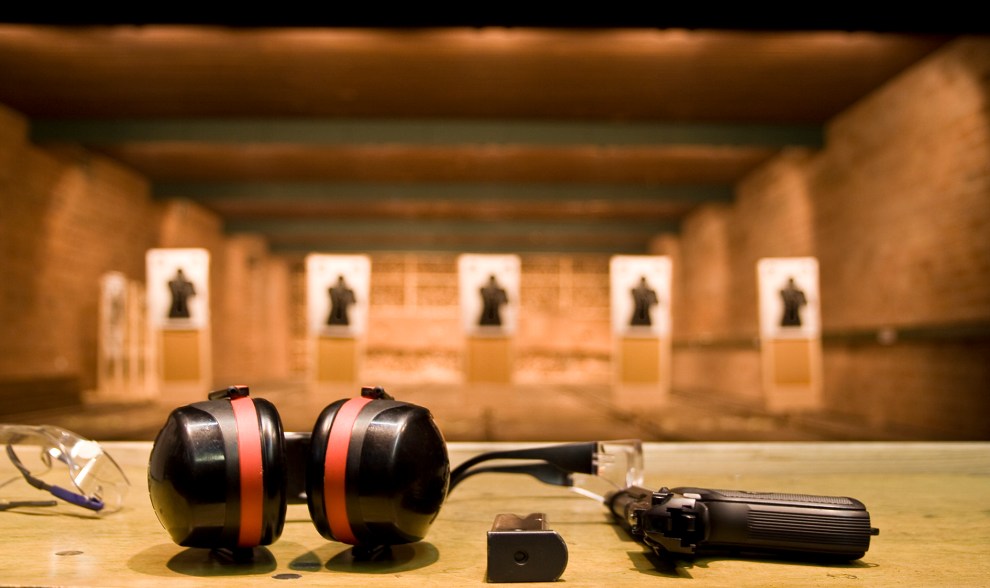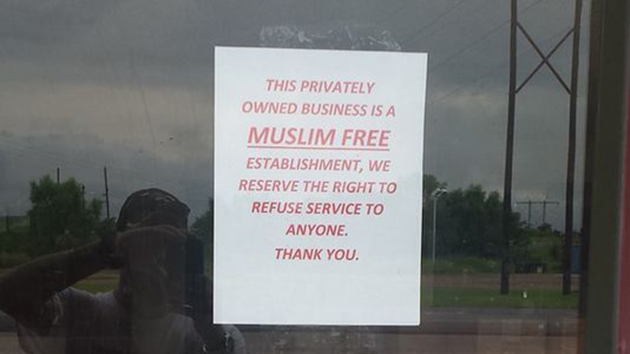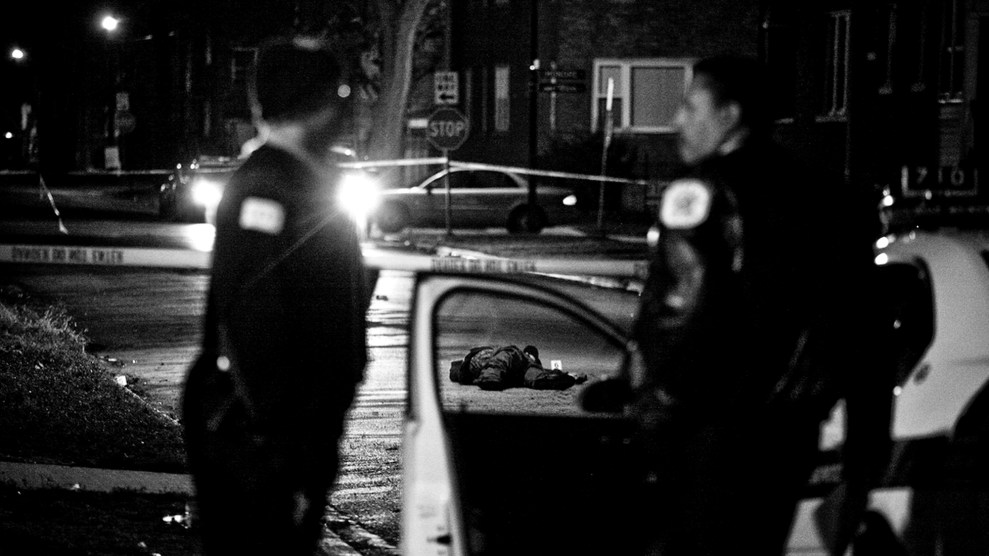
Bostjant/iStock
Editor’s note: Americans today aren’t just stockpiling guns in record numbers; they are also shooting them at upward of 2,100 gun ranges across the country. In February, the pseudonymous author of this piece—a former employee at a gun range in Orange County, California—contacted Mother Jones reporter Josh Harkinson, who interviewed the author and corroborated his account (as told to Harkinson below) through official documents, news reports, and interviews with two other former employees of the gun range. The management and owner of the gun range did not respond to multiple requests for comment.
I’ve worked in the firearms industry for decades, including at a range in Orange County, California. It’s inside an industrial park, in your standard warehouse type of building. People come in and say, “Oh, I never knew this place existed.” Once you check in, there are two entryways and 16 lanes. The lanes are monitored by video cameras, and there are also large double-paned windows, which, it turns out, are not made of bulletproof glass.
I later worked as a contractor at ranges all over the region. I’ve seen a lot. I’ve witnessed multiple suicides. Three rampage shooters practiced at the Orange County range. The general vibe at the ranges has gotten much more extreme and paranoid. I don’t think this is unique to where I worked. The gun industry is really changing for the worse.
I was attracted to guns as a teenager because my family had been victims of violent crime. My dad had been mugged and my family has been held up in their store at least a couple of times at gunpoint. I guess you could say it’s a way of reclaiming some sense of power over a powerless situation.
My first gun was a military surplus bolt-action, a Lee Enfield. The ATF has a category for these things: curio and relic weapons. It was the only gun that at 18 years old I could legally purchase and walk out the door with. It was fully capable of punching through a car or a cinder block. I started buying and fixing up other relic firearms. At the time I was a college student; I’d sell a gun and use the money to pay for my books. I can’t even remember all the guns I’ve owned. That’s part of what attracted me to working at the range. You would see all sorts of different guns come through. I also came to enjoy the camaraderie. In some ways it’s not just a range so much as a gathering place for a certain type of crotchety old man. You sit there on the bench and drink your nasty cup of coffee and trade lies and war stories. For me, it was something that I kind of didn’t have growing up, because my dad wasn’t always there.
But there were certain people who were difficult. At some point during the day, you would have a gun pointed at you. I had a guy with Parkinson’s, and he had severe muscle tremors. He can’t hold the gun properly, and it jams. He walks off the range, he’s pointing the gun at me, and he’s saying, “Hey, hey, my gun is jammed!” I sidestep the muzzle and say, “Let’s have a look, shall we?” All the while that I am handling it I am saying, “You really shouldn’t be doing that.” And the guy, without missing a beat, says, “It’s all right, the safety’s on the gun.” I pull the slide back and there’s a live round that ejects from the chamber. And I’m thinking, okay, I was a three-pound trigger pull away from getting shot.
The ranges make a lot of their money from renting guns to people—those are the people you really have to watch out for. Like the time we rented a Ruger handgun to this woman. After I turned my back to her, she put the gun behind her ear and blew a nice, clean, round hole through the center of her head. I didn’t really feel anything at the time. At first it was disbelief, and then I thought, “Oh, I’ve got to take care of stuff.” Different guys handle it differently. I know a guy who quit right after something like this happened.
Our standard operating procedure when this happens is to call a cease-fire. Then we clear the range so that nobody is in any danger. Then sometimes you’d go up and, if it’s safe to do so, you’d kick the gun out. I still remember this: The manager at the time wound up putting gloves on and plugging the side of her head with his fingers. I’m thinking, “This isn’t going to do a whole lot. She’s toast, dude.” Not to be callous about it, but she was dead. Her eyes were flapping, there was nothing there.
Gun ranges often have policies that require anyone who rents a gun to be accompanied by a friend. It’s supposed to be a way to prevent suicides, but it doesn’t always work very well. Eventually the range started paying a service to come pick up the bodies and scrub everything. But before that happened, Christ, what was it? Bleach and kitty litter. I remember one time I had come in for a shift change and there was a pool of blood. We didn’t have any bleach but we did have some kitty litter. I remember using that to soak up the blood. And because we didn’t have the bleach, some of my members were kind enough to go across the street to the grocery store and buy some. In hindsight, we had no protocols, we had no protective suits. I could have exposed myself to blood-borne pathogens.
Another one was a father who was getting divorced. He was a pretty big guy. I felt the impact, and when I turned around there was pandemonium. Some of my members came rushing out the door yelling at me to call the police, and we did. The guy had sent suicidal text messages to his family. It made the paper because he was a beloved figure in the community, big into Little League. He was totally normal acting. And the next thing you know, you have 300 pounds hitting the floor.
I feel sorry for the families. Anybody who is that depressed for the most part has my sympathy. I do get a little bit irritated that they have to do it while I’m on duty. I think it’s kind of—I don’t know if you’d say inconsiderate—but almost that. You can’t really ask these people, “Hey, if you are going to kill yourself, why don’t you do it out in the desert or something like that?”
Around 2002, a middle-aged guy named Hesham Hadayet came into the range. He’d purchased a gun at a store. He asked me, “Hey, can you show me how to load and operate this gun?” I am thinking, “Wait a minute, didn’t you just take a class?” I’m like, “Fine, not a problem.” I think he came in two or three more times. I didn’t pay any attention to it. Well, a few months later, I turn on the TV and I see this guy’s face. He’d shot up a ticket counter at LAX. He killed two people and injured two more before being fatally shot by a security guard.
The second guy, Phong Thuc Tran, also shot at the range. He worked for the gas company and had been forced to resign. After he killed his supervisor and his co-worker, he was running around for like a day or two before he parked his car in front of a police station. That’s where he shot himself. We only found out about it when the local cops walked in. The guy, he was a little off, but he was very quiet, respectful. No outward signs of anger. You never would’ve known.
The third one, Scott Dekraai, practiced at the range in 2011 and after that he goes on a shooting rampage. He shot nine people at the Salon Meritage hair salon in Seal Beach, including his ex-wife. Only one of them survived.
We talked about them amongst ourselves, but if a member of the shooting public comes in and wants to, we pretty much dummy up. Because who wants to say, “Hey, yeah, there was a mass murderer here at the range?”
There are some good bosses that run these ranges, but for the most part they willingly overlook the fact that this stuff is dangerous. And I’m not just talking about the guns. They’re supposed to properly train people for handling lead, which gets released in large quantities by spent bullets. There’s not really a safe level for lead in your body once you get above five micrograms per deciliter of blood. At the end of the day, you’ve got various things that you have to clean up: the brass shells, paper from the targets, un-burnt powder from the ammunition, little bits of atomized lead. Anything with high enough concentrations of lead is supposed to be put into a canister and treated as hazardous material, but that didn’t always happen.
We’d get tested for lead in our bodies maybe once or twice a year. They would kind of look sideways at you if you asked for the test results. I knew better than that. I just said, “The hell with it.” But the last test that I had, it came back high. I was contacted by the California Department of Public Health, and the guy said, “Uh, why is your lead level so high?”
I started noticing a difference in the type of people coming to the range when Bill Clinton was president. It was the first time I had actually seen somebody post a picture of the president as a target. I told them, “Look, you can’t do that.” Now there’s a company that sells targets with images of Obama, and they put apelike features on him.
You never would have seen something like that 20 years ago when I started. It’s an echo chamber. It’s a place where people feel safe because they feel that people are of like mind. A few months ago, this woman wanted to know about getting her license. I asked her, “What do you need the gun for, if you don’t mind my asking? Was there a crime?” She said, “No, I think there’s going to be an influx of Muslims coming in from our southern border and then they are going to start killing people.” I’ve had people come up to me and say, “I don’t like it that you show these ragheads how to shoot.”
Paranoid? What would you call it when people have six months worth of food? What would you call it when people have 30-plus guns? What would you call it when they are stockpiling ammunition? The gun industry is making a killing, and it’s doing its best to fan the flames. You see stuff in internet gun forums like, “Hey, FEMA is purchasing a million and a half rounds of ammunition.” It’s supposedly because the government is preparing to come around and knock on your door and round you up into camps.
It all plays into people’s paranoid fantasies, and guns are always the solution. They give people a sense of control in a world that is out of control. You go into the NRA convention and look around at the sea of faces— I’m sorry, it’s a bunch of paranoid white guys who see their country slipping away from them. They think people like Trump, or the gun industry, are the “real” Americans. The gun industry could give a rat’s ass. They are laughing all the way to the bank.
I’m leaving the industry to make better money. Dude, I will still be into guns. I like working on ’em. My friends and I still shoot. But the other motivation, just as strong perhaps, is that I don’t want to have to be around a bunch of crazy people.
















